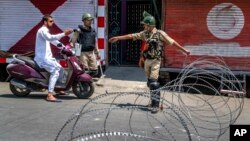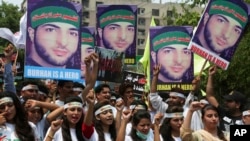Indian police say they are investigating a claim by al-Qaida that it has established a new group in Indian Kashmir.
It is the first time a global terror outfit has claimed a presence in Kashmir, where local Islamic militant groups have led a violent, separatist insurgency.
Al-Qaida announced the establishment of the Ansar Ghawzat-Ul-Hind, to be led by a local commander, Zakir Musa, on its online information network, the Global Islamic Media Front.
Musa represents a new generation of young militants who Indian experts say are radicalizing young Kashmiris to revitalize an insurgency that had become dormant, but has flared in the past year.
‘Militant is a militant’
Kashmir’s police chief, S.P. Vaid, said Friday that they would monitor the impact of the announcement, but that anyone who picks up the gun to fight the state is a terrorist.
“A militant is a militant, to whichever tanzeem (outfit) he belongs,” he said.
Questioning whether al-Qaida would make any impact in Kashmir, counterinsurgency experts pointed out that a previous announcement by the group in 2014 to set up an Indian wing made no mark among India’s Muslim population, the third largest in the world.
Insurgency dismissive
The decades-long separatist insurgency in Indian Kashmir is led by groups like the Hizbul Mujahideen and Lashkar-e-Taiba, which say they are waging a freedom struggle, but whom New Delhi labels as terror groups and proxies of Pakistan. Kashmir, India’s only Muslim majority region, is divided between India and Pakistan and these groups have bases in Pakistani Kashmir.
Both groups have been quick to dismiss any role for the global terror outfit.
Following the al-Qaida announcement, the leader of Hizbul Mujahideen, Syed Salahuddin, said in a statement that, “there is no scope or room for any international organizations like Daesh (Islamic State) and al-Qaida, we don’t need them nor is there any necessity for their presence.”
The Lashkar-e-Taiba called al-Qaida’s bid for a presence in Kashmir an Indian ploy to label their “legitimate freedom struggle” as “terrorism.”
No threat escalation
Ajai Sahni, head of the Institute of Conflict Management in New Delhi, says the latest announcement does not represent a significant escalation in threat in Kashmir.
“The operational capacities don’t change,” he said. “What is happening both with the al-Qaida and earlier with the Islamic State, there has been an effort to rebrand local groupings operational in the area and project them as part of this local jihad.”
Musa was close to Burhan Wani, a charismatic local militant whose killing by armed forces last year triggered a fresh spiral of violence in Kashmir and revived militancy.
Musa, who is believed to have turned to militancy sometime in 2013, initially joined the Hizbul Mujahideen. But he split with the group after voicing an ideology more aligned to that of global terror groups like al-Qaida. He said last year the fight in the region should not be for the sake of Kashmir, but should be exclusively for Islam so that sharia is established here.” He has also spoken up against local separatist leaders.
Sahni said radicalization of young Kashmiris is the real threat that India needs to watch out for.
“Radicalization has gone unchecked in the valley for 50 years now and it has become a very, very, very serious problem,” Sahni said.





